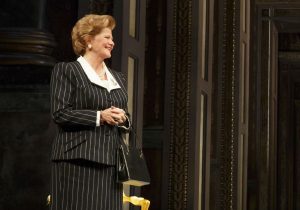“When did the rich people become Democrats?” a middle-aged woman asks in What Did You Expect?, the second installment in Richard Nelson’s new trilogy of plays The Gabriels: Election Year in the Life of One Family. Later in the same scene, the character, who literally serves the wealthy working for a caterer, imagines what she and countless others will be thinking as they tune in for the Clinton/Trump debates in the coming weeks: “Hillary, please be human. Please.”
At a recent performance of Expect, at the Public Theater, these lines were met with titters of laughter, expressing both amusement and, it seemed, a little anxiety. Wait, I imagined some fellow audience members thinking, shouldn’t we be putting such concerns aside right now? Aren’t we, as Public artistic director Oskar Eustis points out in his program notes, “in the midst of the most divisive, unpredictable and dangerous election season of our lifetime”?
The second point is beyond dispute. But the playwright faces a different responsibility, at least outside the voting booth, than other citizens. The Gabriels, like Nelson’s previous The Apple Family Plays, concentrates less on the political process than the previous references might suggest. But these intimate domestic dramas, set in the present (the series closer, Women of a Certain Age, takes place on Election Day, and will open then), offer a timely reminder of the value of candor and nuance in looking at the larger forces impacting us.
Even at this late point in a campaign season that has invoked such richly deserved disgust, with so much at stake, creative artists—certainly one aiming to portray reality as faithfully and naturalistically as Nelson does—avoid uncomfortable contradictions at their own peril. Likewise, there’s a fine line between righteous protest and glib demonization of people and ideas that a projected majority of the audiences don’t agree with, or even rightfully abhor, in the case of Clinton’s only major-party rival.

Anyone who sees Broadway productions regularly can point to an instance, in a musical or play not written by David Mamet, in which the word “Republican” was used as an automatic barb. Snide portraits of right-leaning characters, real or fictional, provide easy laughs and applause lines, and generally don’t hurt critical notices either. One of the more lavishly praised (and soon to be most frequently produced) dark comedies in recent seasons, the Off-Broadway transfer Hand to God, lampooned members of a small Southern town as repressed, small-minded religious zealots or outcasts. The British import The Audience, which also arrived last year, portrayed Ronald Reagan’s buddy Margaret Thatcher as so grossly fiendish that she registered as more of a cartoon villain than our current Republican candidate. Her predecessors in Labour, in comparison, glowed with integrity and decency.
Such approaches can leave us with a sense of moral and intellectual superiority we don’t necessarily deserve. They spare us, and the playwright, the challenge of facing tough questions about our own capacity for intolerance and narrow-mindedness. Nelson, in contrast, confronts us with them, however gently, as when Hannah describes how her husband, George, a piano teacher and cabinet maker, was recently sized up by a client: “This guy just looks at George, looks him up and down, at his jeans that are stained, his dirty hands, and says, ‘I hope George you’re now not going to vote for—him.”
“Him” would of course be Trump, whom Nelson doesn’t take to task as specifically as he does Clinton. But the Donald actually looms as a larger and much darker presence in Expect, precisely because no one can bear to discuss the unfathomable possibility that he’ll prevail.
The mockery of high-profile malefactors was practiced by some of the greatest playwrights of the 20th century, from Brecht to Tony Kushner. But in their best work, they presented or alluded to historical monsters to underscore the flawed humanity of their more sympathetic characters, who were not above reproach or satire. That’s one reason why Mother Courage and Her Children is so much more affecting than The Resistible Rise of Arturo Ui. Other giants—Arthur Miller, August Wilson, Tom Stoppard—made the impossibility of perfect virtue in a messed-up society a key theme, giving us characters who deserved compassion and dignity not just in spite of their flaws but because of them. (Had Wilson only lived to witness our current election cycle—or the past two, for that matter.)
A number of contemporary playwrights have absorbed these lessons, and tried to apply them to our own polarized times. Taylor Mac’s Hir, staged Off-Broadway last season, studied and sent up family dysfunction in the age of gender and identity politics to hilarious, poignant effect. Lynn Nottage has channeled cruel injustices both in this country and outside it into plays that are both three-dimensional and vividly entertaining. (Her newest, Sweat, opens soon at the Public, after productions at Oregon Shakespeare Festival and Arena Stage.)
For his part, Nelson is one of several contemporary playwrights who seem to reach further back for inspiration: Eustis, in his notes, compares the characters in Expect to Chekhov’s, who “are worried about the direction their country is heading in” and “feel powerless to change the world” but “lean into their love for each other.”
Notably, Roundabout Theatre Company’s Broadway revival of The Cherry Orchard, now in previews, features a new adaptation by Stephen Karam, who so beautifully captured the tenuousness of modern middle-class life in the Tony-winning The Humans, and in other plays that have mixed a sharp wit with a delicate but probing social and moral conscience. What will Karam make of Chekhov’s dying aristocracy and rising bourgeoisie in our age of identity politics and revived populism, when a newly privileged class seems to be at once expanding and growing more detached?
I can only hope for keener, more encouraging insights than I expect from the remaining presidential debates. But I’ll be watching all the performances, and hoping for the best.


